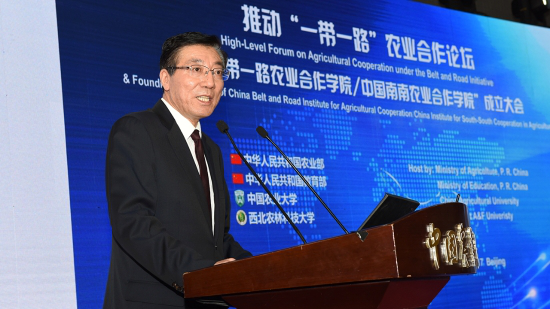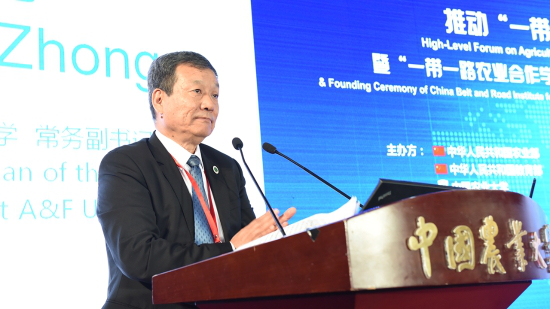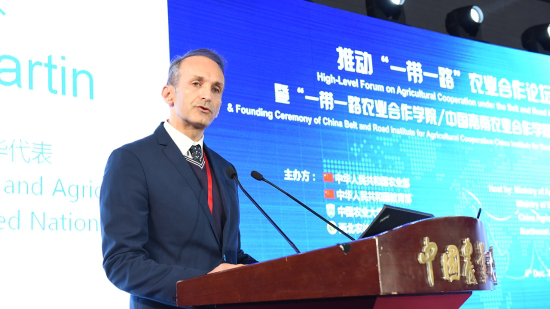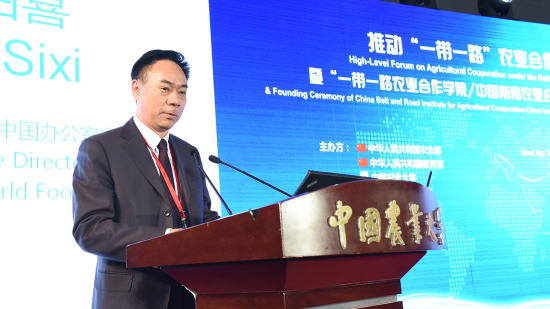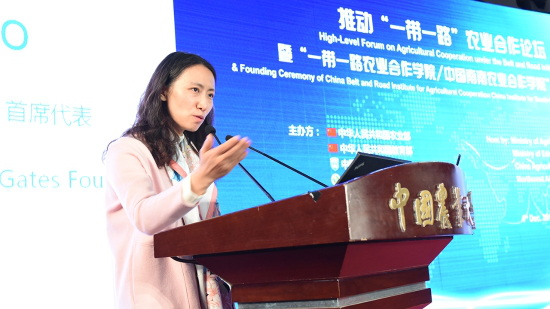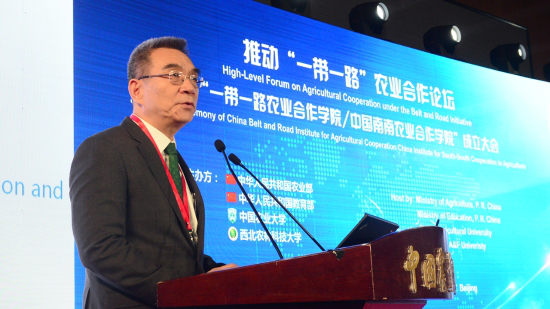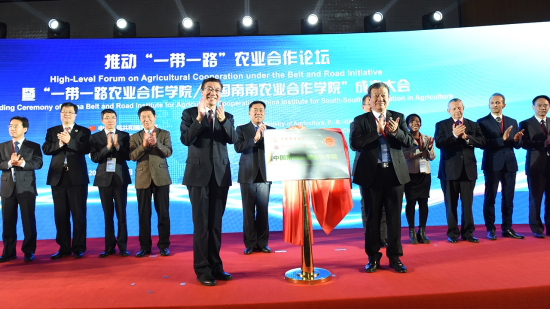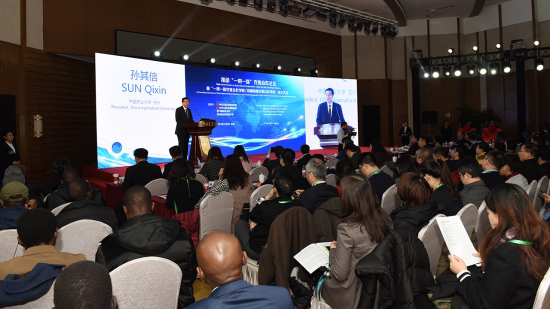| China Agricultural University establishes “China Belt and Road Institute for Agriculture Cooperation (BRIAC)”and “China Institute for South-South Cooperation in Agriculture (CISSCA)” together with Northwest A&F University |
On December 4, 2017, the founding ceremony of China Belt and Road Institute for Agricultural Cooperation/China Institute for South-South Cooperation in Agriculture, organized by China Agricultural University (CAU), was held and the Belt and Road international cooperation activity has been fully activated. Leaderships from National Development and Reform Commission, Ministry of Agriculture, Ministry of Commerce, and State Forestry Administration of the P.R.C, 9 officers from consulates in China (like the Tanzanian consulate in China), representatives from the United Nations Development Programme and United Nations agencies in China, delegates from the China offices of World Bank, Bill & Melinda Gates Foundation, and other International agencies, Geurts, the director of the International department, Wageningen University, Lin Yifu, the Dean of the Institute of South-South Cooperation and Development, Peking University, and other 150 domestic and international scholars attended the ceremony. The Director of UN South-South Cooperation under the Secretary General and Former Prime Minister of the United Republic of Tanzania sent their congratulatory video and message. Jiang Peimin, the Chairman of the University Councilof CAU, Sun Qixin, the President of CAU, Zhao zhong, the Executive Chairman of the University Council from Northwest A&F University and Luo Jun, the Vice president of Northwest A&F University also participated. The ceremony was hosted by Gong Yuanshi, the Vice President of CAU. Sun Qixin pointed out that to study and put the guiding principles from our 19th National Congress into action, to actively promote new south-south cooperation and collaborations in agriculture between countries alongside, we CAU, under the support from Ministry of Agriculture and Ministry of Education, has made the commitment to establish “China Agricultural University Belt and Road Institute”, and together with Northwest A&F University to establish “Institute for South-South Cooperation in Agriculture”. It is our practical effort to help construct a community with a shared future for mankind. It is a pioneering project in response to China’s broader international cooperation, promoting the common development and prosperity of developing countries. Zhang Lubiao, the Deputy Minister of Department of International Cooperation, MOA, addressed that to fulfill the “Belt and Road” Initiative, the nation has founded the ministerial joint meetings for external cooperation in agriculture which led and coordinated by Ministry of Agriculture. With combining and utilizing resources, markets, and regulations at home and abroad from design to implement, the shape of outbound agricultural cooperation has initially formed. The significant documents such as Vision and Actions on Promoting Energy Cooperation on the Belt and Road have also issued. The two institutes are the practice of the two Double First-rate agricultural universities to support education and technology which are important for national “Belt and Road” cooperation in agriculture and the South-South cooperation of United Nations. Ministry of Agriculture will strongly support the institutes’ research, training, and service. Vincent Martin, Food and Agriculture Organization of the United Nations (FAO) Representative in China, pointed out that according to the past of the South-South cooperation, it could be found that the geopolitical environment of the cooperation has got substantive change. The new South-South cooperation focuses more on the improvement of grassroots’ living standard and agricultural development. The establishment shows that the “Belt and Road” initiative contributes to the new South-South cooperation, international cooperation in agriculture, and agricultural development. Qu Sixi, the China office Director, World Food Programme, suggested that the establishment was really a good news in the field of education and technology. The “Belt and Road” initiative motivates the countries participating in the cooperation and contributes to global sustainable development. Now World Food Programme has started its new strategy to eliminate hunger in the world by the South-South cooperation. He hopes that the institutes will work hard for China’s and the world’s development. Li Yinuo, the Director of China Office of Bill & Melinda Gates Foundation, CAU’s research groups who focus on international development has made its brilliant achievement in Africa. The foundation will continue to support them to research and expect the institutes will conduct deeper cooperation in the fields above. Lin Yifu, the Dean of Institute of South-South Cooperation and Development, Peking University, extended his warm congratulation. He spoke highly of CAU’s contribution to South-South cooperation and showed his high hopes for the institute’s effects in agricultural education, technology, and services. In his keynote speech, it is mentioned that simply copying the experience and theory from developed countries cannot help developing countries to realize their modernization. China’s practice, experience and new theory about development and shifting, however, are better reference to developing countries. Jiang Peimin and Zhang Lubiao unveiled for China Agricultural University Belt and Road Institute On the ceremony, Jiang Peimin and Zhang Lubiao unveiled for China Agricultural University Belt and Road Institute and Sun Qixin and Zhao Zhong unveiled for Institute for South-South Cooperation in Agriculture. Luo Jun, the Vice President of Northwest A&F University, Li Xiaoyun, the Dean of China Agricultural University Belt and Road Institute and Institute for South-South Cooperation in Agriculture, Ayesha Wharton, the Acting Ambassador of the Republic of Trinidad and Tobago, Sandra Salamanca, the Minister from the Republic of Colombia, Carlos Parra Merino, the Minister from Chile, counselors of agriculture and education from Tanzania, Hungary, Malawi, and Brazil, Vincent Martin, Food and Agriculture Organization of the United Nations (FAO) Representative in China, Qu Sixi, the China office Director, World Food Programme, Li Yinuo, the Director of China Office of Bill & Melinda Gates Foundation, Li Qun, the Project Officer of World Bank China Office, Geurts, the director of the International department, Wageningen University, attended and witnessed the unveiling ceremony. After the ceremony, there are two parallel forums held: Strategies and policies for South-South cooperation in agriculture under “the Belt and Road Initiative” and International Experience and Road Map of South-South Cooperation in Agriculture. 150 domestic and international scholars attended the forums.
|
 Date:2018-12-14 View:
Date:2018-12-14 View:
